|
In the Blood
Allan Richardson was born into a railway family - three
generations of his forefathers worked on the railways.
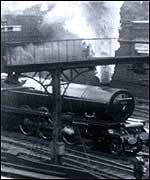 |
|
The
golden age of steam |
His grandfather
started working on the railways in 1893, whilst his father took to the
rails in 1918.
Allan Richardson
followed in their footsteps, starting work at Grantham in 1937.
Allan's
first job was as the office boy in the Grantham locomotive shed.
He remembers
the early days of the railway offices being very Dickensian.
"The
loco superintendent was one step down from God," he recalls.
A Dirty
Job
In 1940
Allan Richardson came out of the office and started work as an engine
cleaner. He remembers the job as being very messy.
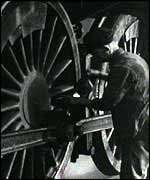 |
|
It was a dirty but fulfilling job |
"It
was very very dirty with oil and grease from the engines."
"Sometimes
you got a messy job with suicides - even cattle. You'd have to clean them
from the underside of carriages."
"You
worked in a team, and you got 20 hours with five of you allocated. The
senior one did the boiler and tank, the junior one did the dirtier jobs."
"They
were really dirty. You were soaked in rags of paraffin from rubbing the
engine down."
"Imagine
having an Aladdin's lamp, or an oil lamp with a wick that you fill with
paraffin. You lit it and there you were under the engine - it was smokey
and dirty."
"You
were absolutely filthy. Apart from doing the cleaning, there was also
larking around, throwing rags at one other."
A Tough
Winter
1947 was
one of the most severe Winters in living memory, and it caused chaos on
the railways.
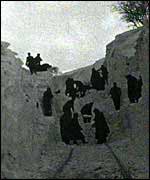 |
|
Heavy snow was a hazard |
Allan Richardson
recalls how the men toiled to keep the railways open.
"It
was snowing - snow, snow, snow - terrible. We set off, did our job, got
to Peterborough and they sent us back."
"A
train was stuck in the drift. I jumped off the train and there was snow
up to my waist. Bob (his workmate) said 'If I ever see the sun again,
I'll never believe it!"
The conditions
were so bad that three coal trains were stuck in the drifts for six weeks.
The Joy
of Steam
Working
on the railways did have its advantages like driving a steam train in
good weather.
"There's
really no feeling like driving a steam engine. It's entirely up to you.
It's a physical thing - you're using every sense, sight, sound, touch,
smell. It's a marvellous feeling."
But it came
at a price - being a driver could be hot and demanding work.
"It
was very uncomfortable. You were hanging out of one side and being roasted
by the other - an odd sensation."
Diesel
Dreams
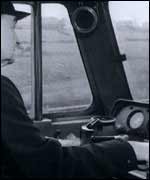 |
|
Just press and go - the joy of
diesel |
The transition
from steam to diesel marked a major turning point in the history of the
railways.
"It
was marvellous to be honest," says Allan. ""You couldn't
get away from steam quick enough."
"Imagine
getting up at 2 or 3 am and going to a smoke-filled shed with one hour
to get your engine ready."
All of a
sudden it was transformed to a set of keys, press a button, start the
engine and you're away."
Nationalisation
Many of the railway workers were optimistic about nationalisation,
believing it would improve prospects for the rail industry.
"Everybody was full of hope. We were downhearted
that the railways were ground down during the war. There was no investment."
"We were all elated and overjoyed. We were going
to get the engines we wanted, it was going to be different," says
Allan.
But those high hopes were to be smashed by events that
followed.
End
of an Era
Allan Richardson remembers the post-nationalisation years.
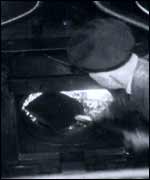 |
|
Stoking up trouble - changes post-nationalisation
weren't always welcome |
"It was sad, really sad - the way the railways we're
carved up. It was scandalous. We all thought that there would be more
investment."
It was the beginning of the end for Allan.
"The atmosphere in the 1970s was terrible. It was not a nice time
at all."
"I finish in 1986. Since then it's been broken up
too small. The fragmentation has been terrific and horrific. I would like
to see it as it was before."
Allan is nostalgic about the days when the passengers
would come and say 'thanks' when you ran into King's Cross.
In later years Allan believes that working on the railways
lost that special feeling, and the feeling of job satisfaction.
It was the end of an era in railway history.
|

